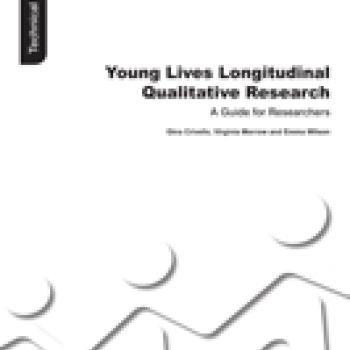
There are very few studies in developing and low-income countries that combine a child-focus, with survey and qualitative methods, and a longitudinal research design. Young Lives is a fifteen-year mixed-methods study of childhood poverty being carried out in four developing country contexts: Ethiopia, India (in the state of Andhra Pradesh), Vietnam and Peru. Children are at the heart of all aspects of what we do in Young Lives – our research questions and analyses reflect a focus on child well-being and on children’s experiences, and the goals of our policy work include using our research findings to influence policies for the benefit of children and families.
This ‘Guide for Researchers’ describes the development of one of the key strands of Young Lives research; in 2007, a Longitudinal Qualitative Research component was developed to complement the panel survey of all 12,000 children and their families. We invited a sub-group of children from the larger Young Lives sample to participate in qualitative research over a seven-year period (2007–2014). The qualitative approach enables us to gain an in-depth understanding of children’s views and opinions, and the long-term design allows us to document change and continuity in their lives and their life trajectories over time. This guide provides background information to this line of research, including the rationale, evolution of research questions, pilot work, description of individual tools, and a summary of ethical methodological challenges (and promises).
See also Laura Camfield, Gina Crivello and Martin Woodhead(2013a) Young Lives Qualitative Fieldwork Guide: Round One (2007), Young Lives Technical Note 27. Laura Camfield, Gina Crivello and Martin Woodhead (2013b) Young Lives Qualitative Fieldwork Guide: Round Two (2008), Young Lives Technical Note 28. Gina Crivello, Virginia Morrow and Natalia Streuli (2013) Young Lives Qualitative Fieldwork Guide: Round Three (2010/11), Young Lives Technical Note 29. Gina Crivello and Emma Wilson (2016) Young Lives Qualitative Fieldwork Guide: Round Four (2013/2014), Young Lives Technical Note 34.

There are very few studies in developing and low-income countries that combine a child-focus, with survey and qualitative methods, and a longitudinal research design. Young Lives is a fifteen-year mixed-methods study of childhood poverty being carried out in four developing country contexts: Ethiopia, India (in the state of Andhra Pradesh), Vietnam and Peru. Children are at the heart of all aspects of what we do in Young Lives – our research questions and analyses reflect a focus on child well-being and on children’s experiences, and the goals of our policy work include using our research findings to influence policies for the benefit of children and families.
This ‘Guide for Researchers’ describes the development of one of the key strands of Young Lives research; in 2007, a Longitudinal Qualitative Research component was developed to complement the panel survey of all 12,000 children and their families. We invited a sub-group of children from the larger Young Lives sample to participate in qualitative research over a seven-year period (2007–2014). The qualitative approach enables us to gain an in-depth understanding of children’s views and opinions, and the long-term design allows us to document change and continuity in their lives and their life trajectories over time. This guide provides background information to this line of research, including the rationale, evolution of research questions, pilot work, description of individual tools, and a summary of ethical methodological challenges (and promises).
See also Laura Camfield, Gina Crivello and Martin Woodhead(2013a) Young Lives Qualitative Fieldwork Guide: Round One (2007), Young Lives Technical Note 27. Laura Camfield, Gina Crivello and Martin Woodhead (2013b) Young Lives Qualitative Fieldwork Guide: Round Two (2008), Young Lives Technical Note 28. Gina Crivello, Virginia Morrow and Natalia Streuli (2013) Young Lives Qualitative Fieldwork Guide: Round Three (2010/11), Young Lives Technical Note 29. Gina Crivello and Emma Wilson (2016) Young Lives Qualitative Fieldwork Guide: Round Four (2013/2014), Young Lives Technical Note 34.

